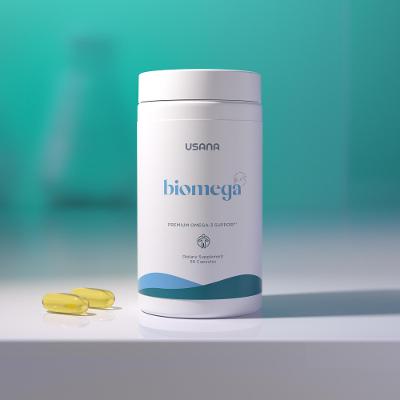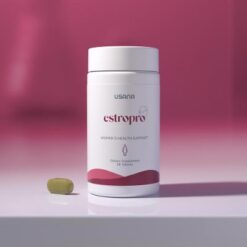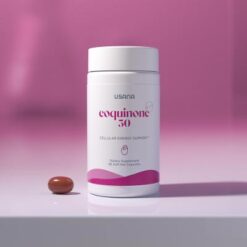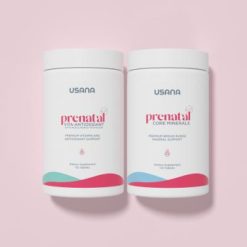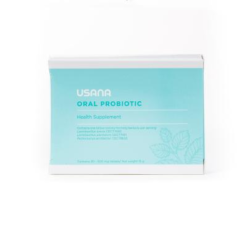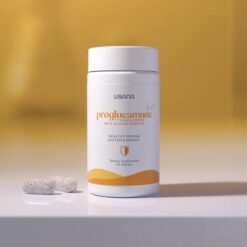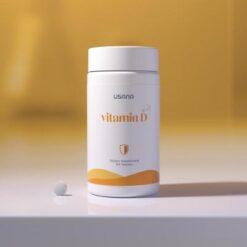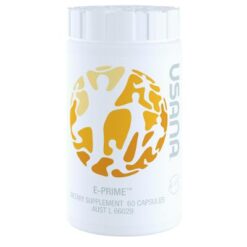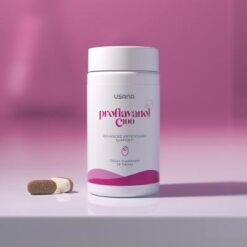USANA Biomega
USD $32.95 Original price was: USD $32.95.USD $29.95Current price is: USD $29.95.
USANA BiOmega contains 1000mg of High Quality Mercury Free Fish Oil, supplying the important omega-3 fatty acids EPA and DHA including Vitamin D.
Product Description Below
USANA Biomega – Omega 3 Fish Oil.
The Secret Behind Healthy Fats.
Over the past few decades, fat went from being our number one worst enemy, to an essential macronutrient needed for many important health reasons.
While diets that were rich in burgers and fries contributed to an obesity epidemic, we were able to discover that not all fats led to chronic conditions like heart disease and diabetes. In fact, some helped us to not only fight these illnesses but prevent and reverse them entirely.
Luckily as fitness and nutrition found its home on the internet, more information became readily available, and people were able to learn which fats they should include in their diet that may help them live longer.
Visit any health blog or website and scroll through their nutrition blogs. There is a really good chance you’ll find at least one article about fish oil and the many ways it can benefit your health.
But the fact of the matter is, regular supplementation with the right kind of fish oil can impact your overall health in many amazing ways.
But as you probably know, the supplement industry is saturated with companies that claim to bring you the best of ‘this’, and the highest quality of ‘that’.
Confusing I know. How does one know which brand is actually backing the claims they make? In this article, we will examine a supplement company that lets the science do the talking for them, and produces the best fish oil supplement on the market.
USANA Health Sciences Omega 3 Supplement
Another common term for fish oil is Omega-3. These are the healthy fatty acids found in fish oil and are what provide you with so many health benefits. While fats, in general, have gotten a really bad rap, there is a difference between good fat and bad fat.
Omega-3 are not only good fat, but they are also essential for your body to maintain healthy bodily functions which could include:
- Stronger immune system
- Improved Cardiovascular health
- Healthy brain and nerve function
- Optical health
- Exercise recovery
- Joint health
- Assists in healthier pregnancies
The beneficial and healthy fats found in fish oil are what each serving of BiOmega consists of.
These are known as polyunsaturated fats, and they directly contribute to the healthy functions listed above. USANA Health Sciences, the world leader in developing science-backed supplements, has put their scientific research team to work to develop the highest quality Omega-3 supplement on the market, and here’s why:
Knowing Your Omega 3’s and Omega 6’s

Many fish oil supplements on the market contain two types of fatty acids which are Omega-3 and Omega-6. What’s important to know here that while they are both good for you, Omega-6 fatty acids can actually have negative effects.
While this fatty acid is found in healthy foods, too much of it can lead to higher blood pressure, water retention, blood clotting, and eventually, a stroke.
If they are not paired at the ideal ratio with Omega-3 fatty acids, it could have another negative effect. Since both Omega-3 and Omega-6 fatty acids both compete for healthy enzymes in your body known as “eicosanoids.”
If a fish oil supplement combined with your diet consists of too many Omega-6 fatty acids, you will most likely rob the Omega-3’s of their health potential. This is where the numbers matter and make the difference between an average supplement and a superior supplement, like the one USANA, produces.
Many supplement companies set their Omega-3 to Omega-6 ratio at 1:1, thinking that an even number of each should suffice. But through dedicated research and testing, USANA discovered that the actual ideal ratio for these fatty acids is 4:1 (3 to 6). And this is the ratio found in each serving of BiOmega.
Dietary choices make the biggest impact on how much good fat we consume, and the ratio of fatty acids in them. There are only a small amount of foods that contain the ideal 4:1 ratio that our body prefers, so you must choose a fish oil supplement like BiOmega, to ensure that you do have the perfect supplement to meet your requirements.
More about Omega-3 Fatty Acids
While there are various kinds of omega-3s, the three most popular ones are alpha-linoleic acid (ALA), EPA, and DHA. These can be found in various food sources, and we have listed an example below:
- Nuts and Seeds such as walnuts, flaxseeds, and chia seeds are excellent plant-based sources of ALA. These are broken down when ingested and converted to EPA and DHA.
- EPA and DHA can be obtained directly from fatty fish such as salmon, anchovies, tuna, and sardines.
But let’s face it, eating enough fish, nuts, and seeds throughout the week is not always easy or practical.
Some people simply don’t like these foods, and others don’t have the time or money to prepare salmon fillet or pay for expensive nuts.
The recommended daily intake of EPA/DHA is anywhere from 250mg to 2 grams depending on a person’s body weight, yet the average person only consumes between 30-100mg per day.
And even if you are a fish lover, the ever-rising mercury levels found in fish make it risky to eat it in large amounts. This is why an Omega-3 supplement like BiOmega, with a perfect 4:1 ratio, is not just a good idea, it’s essential.
Should I Take Fish Oils?
A healthy diet is and always will be our first line of defense against chronic diseases. This means keeping unhealthy trans fats and large amounts of saturated fats of your plate so you can potentially live longer and healthier.
But when scientists took a good look at healthy fats, they discovered that there was still some room for improvement when it came to getting the perfect balance of fatty acids.
USANA Health Sciences took this research and used it to develop the best fish oil supplement on the market, BiOmega.
Don’t trust your long-term health with a supplement that is not backed by hard science. USANA and BiOmega put your health first and deliver the supplements that work, and work well.
*Vitamin Supplements should not replace a balanced diet.
USE ONLY AS DIRECTED. ALWAYS READ THE LABEL.
*These statements have not been evaluated by the Food & Drug Administration. This product is not intended to diagnose, treat, cure, or prevent any disease.
Body Benefits
Total Body Health
Some products simply can’t be placed into a single body system category and USANA BiOmega Fish Oil is one of them.
Additional trace minerals, mixed carotenoids, bio-flavanoids, and other phyto-chemicals help make these products the premier line of nutritional supplements. Our Total Body Health products provide a comprehensive range of vitamins, minerals, and antioxidants for daily nutritional support.
USANA Total Body Range includes:
- Its free to join.
- It's easy to do. learn more
Related products
Optimizers
Diet & Nutrition
Womens Health
Oral care
Optimizers
Optimizers
Optimizers






